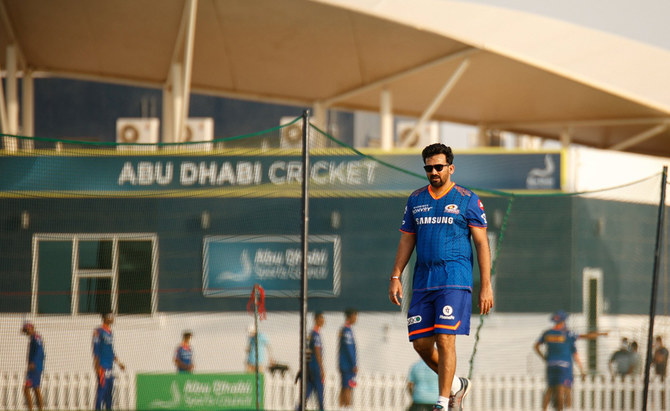As the 2021 cricket season in the UK enters its final month of activity, with a crammed program of events to be completed, my thoughts begin to turn to a different epicenter for the game.
On Sept. 19, the Indian Premier League will resume in Dubai, having been suspended in India on May 2 with 29 of its 60 matches completed. The final is scheduled for Oct. 15, also in Dubai, with 17 matches being played in the UAE cities of Sharjah and Abu Dhabi.
Following swiftly on, the men’s T20 World Cup opens on Oct. 17 in Oman, where the hosts will play Papua New Guinea, and Bangladesh will face Scotland. Sixteen teams will participate, with eight competing in two groups of four, the top two in each group qualifying to join the other eight in a super 12 stage starting on Oct. 23.
The teams will compete in two groups of six, leading to semi-finals between the top two finishers in each group and a final in Dubai on Nov. 14. Apart from Oman and Dubai, matches will be hosted in Abu Dhabi and Sharjah.
These are the two standout forthcoming events in international cricket, which continues to be buffeted by political, social, and economic events beyond its control.
The most tragic of these is the situation that has unfolded in Afghanistan, currently a full member of the International Cricket Council. In order to maintain its position, the country must operate both a men’s and women’s national team. But severe doubts exist as to whether a women’s team will be allowed to continue to play.
Next month, the Afghan men’s team was due to play in the T20 World Cup in the UAE and Oman. In preparation, it was planned for the squad to play a three-match one-day international series against Pakistan in Sri Lanka, starting on Sept. 3. However, the plan was scuppered by a lack of flights and a 10-day coronavirus disease (COVID-19) lockdown imposed in Sri Lanka on Aug. 20. The respective cricket boards agreed to switch the series to Pakistan but on Aug. 24 decided that the challenges were too great to overcome, and the series was rescheduled to take place next year. The team’s preparation for the T20 World Cup has been tinged with further uncertainty. Apart from the direct impact on the Afghanistan teams, the political transition has other cricketing consequences.
On completion of a two-match Test series against the West Indies, Pakistan is hosting a five-match T20 series and a three-match one-day series, starting on Sept. 17, against a New Zealand squad, minus some well-known players. Permission has been given for COVID-19-vaccinated spectators to attend within a maximum 25 percent capacity. The series will be the first time that New Zealand has toured Pakistan for 19 years, when a bomb blast during a Test in Karachi brought an end to the visit.
The England men’s and women’s teams are due to tour Pakistan in mid-October, each for white ball cricket. The last England men’s tour was in 2005. The Pakistan Cricket Board’s chair is confident that there will be no problem in hosting the matches. England were also due to tour Bangladesh in late September/October, but this has been postponed. Conveniently, it allows players of both sides to re-join the IPL.
There is much flexibility in the responses of the cricketing authorities to an unpredictable external environment. This has also been apparent in the women’s game. The qualifying pathways for the 2023 Women’s T20 World Cup take place between late August and late September in five groups, one team qualifying from each group for progression to the next stage en route to South Africa in February 2023.
In Europe, five teams – Turkey having withdrawn because travel permits could not be authorized in time – competed between Aug. 26 and 30 in Spain rather than Scotland, as originally intended, with Scotland qualifying. Four teams will compete between Sept. 11 and 18 in the US for the Americas place, as planned, as will eight in Samoa between Sept. 3 and 8 for the East Asia and Pacific place. Eight teams in the Asia group, hosted by Malaysia, will compete between Nov. 22 and 28, switched to allow back-to-back men’s and women’s competitions. In the Africa group, hosted by Botswana, 11 teams will now compete between Sept. 3 and 11, rescheduled from October.
It is notable that, out of the 37 teams seeking qualification, eight – Bhutan, Botswana, Cameroon, France, Malawi, Myanmar, the Philippines, and Turkey – are competing in an ICC women’s event for the first time, reflecting the growth in women’s cricket in emerging markets. Argentina and Brazil return to an ICC women’s competition for the first time since 2012.
Having been fortunate to be present at the opening of Rwanda’s international stadium in October 2018, I keep an eye on the progress of cricket in the country. In a recently completed, closely fought, five-match series with Ghana, the latter triumphed by three matches to two. International cricket is alive in many parts of the world, but is it well?
Although live cricket is screened, it needs audience participation, sponsorship, and revenue streams. This has been seriously denuded for the last year, with England and Wales being the first beneficiaries of permissions for capacity crowds.
Fortunately, the IPL and T20 men’s World Cup will take place but without the crowds that would have been in place in India. The game has a tough struggle in the face of economic, political, and social challenges.


























